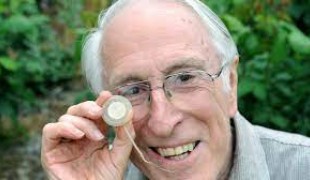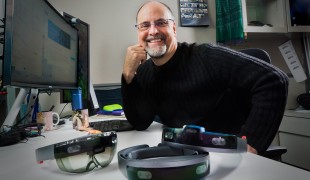- 5599
- 508
- 10
- 9
- 0
- Help Ukraine
About the solution
Elliot Miller had to have a cochlear implant inserted. However, after going through the orientation process, he thought it didn’t fully prepare him for the everyday life. “Shortly after switching the implant on I was out for a jog and I could hear this jingling sound and I couldn’t figure out what it was,” Miller said, “When I would stop [running] the jingling would stop. It was only when I got home that I realised it was the coins in my pocket.”
According to Miller, most people do not realise how overwhelming every sound can be for someone who was previously deaf. “For some people it’s literally like learning a new language,” he says.
Cochlear implants are considered a major medical breakthrough, as they allow people who suffer from deafness the possibility to hear. Profound deafness affects several thousands of people in Australia, and more than 300 have had cochlear implants inserted. Unlike hearing aids, which simply magnify the sounds, cochlear implants are surgically places in the ear canal and mimic the function of the inner ear. This happens using electrical stimulation.
Miller decided to create an app that would help others with cochlear implants learn how to deal with everyday life after the device is on.
After pitching his idea at the 2018 eHealth Queensland Hackathon, he was contacted by the audiology unit at the Royal Brisbane and Women’s hospital.
Miller’s app, called Hearoes, allowed to turn paper-based learning into an interactive program. “We do auditory training with patients, but it’s usually sort of boring paper handouts like homework,” Ms Rose, leader of the audiology unit, said, “Because the app is so engaging - people can do it at home in their own time - we’re hoping compliance is going to skyrocket.”
People who are leaning how to live with the cochlear implants need to understand which sounds are harmless and which represent danger. For them, distinguishing, for example, between a loud laugh and a loud cry can be difficult.
“People think it’s like putting on glasses and suddenly you can see but for the implants it’s a completely different way of hearing,” Ms Rose said.
Hearoes allows users to maintain contact with health professionals, which is especially valuable in regional areas.
The app is available on Google Play.
Adapted from: http://bit.ly/33gGPYz
More info: http://bit.ly/31kQHyF
This solution shall not include mention to the use of drugs, chemicals or biologicals (including food); invasive devices; offensive, commercial or inherently dangerous content. This solution was not medically validated. Proceed with caution! If you have any doubts, please consult with a health professional.
DISCLAIMER: This story was written by someone who is not the author of the solution, therefore please be advised that, although it was written with the utmost respect for the innovation and the innovator, there can be some incorrect statements. If you find any errors please contact the patient Innovation team via info@patient-innovation.com
-
-
455
-
0
-
6581

Parents bring together experts to create smart glasses for their son suffering from low vision
COMMUNICATION: Communicating, whether by speaking, listening, or other means
CAREGIVING
WALKING: Walking
Urban exploration
Tunnel Vision
5 Senses support devices: (glasses, hearing aids, headphones...)
Assistive Daily Life Device (to help ADL)
Vision problems
Regaining sensory function
Promoting self-management
Preventing (Vaccination, Protection, Falls, Research/Mapping)
Caregiving Support
Neurology
Ophthalmology
Pediatrics
Spain
-
-
-
348
-
0
-
3923

Professor Graeme Clark invented the Cochlear Implant
COMMUNICATION: Communicating, whether by speaking, listening, or other means
Listening to music
Congenital Deafness
5 Senses support devices: (glasses, hearing aids, headphones...)
Hearing loss or ringing in the ears (tinnitus)
Regaining sensory function
Promoting self-management
Improving Speech and Communication
General and Family Medicine
Neurology
Otorhinolaryngology
Australia
-
-
-
405
-
0
-
4516

Using AI to allow blind people to find familiar faces
COMMUNICATION: Communicating, whether by speaking, listening, or other means
Social interaction
Blindness
5 Senses support devices: (glasses, hearing aids, headphones...)
Body-Worn solutions (Clothing, accessories, shoes, sensors...)
App (Including when connected with wearable)
AI algorithm
Assistive Daily Life Device (to help ADL)
Difficulty communicating with environment
Confusion
Regaining sensory function
Promoting self-management
Promoting inclusivity and social integration
Improving Speech and Communication
Raise awareness
Ophthalmology
Pediatrics
United States
-
 en
en